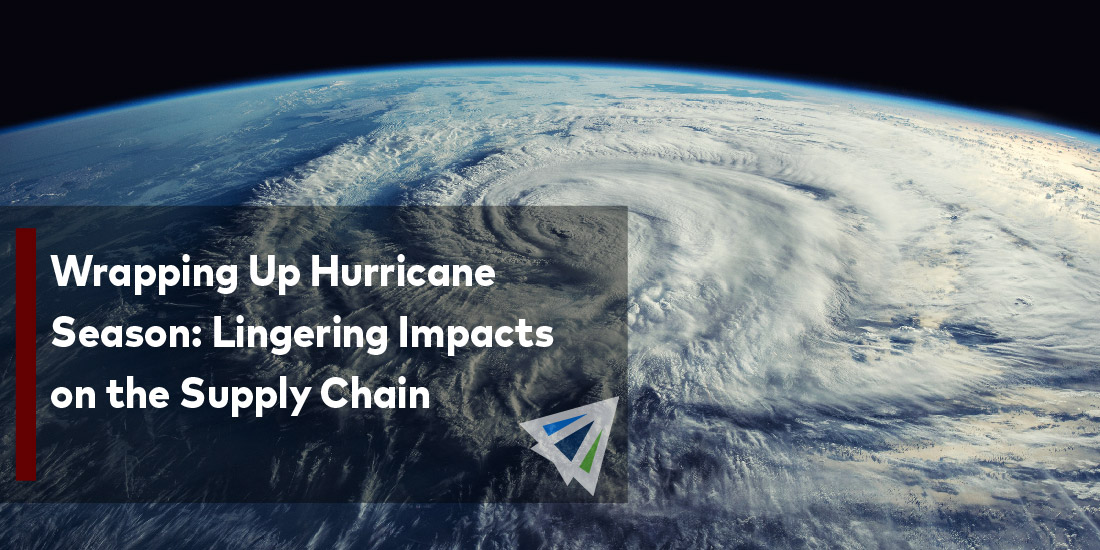It’s time to consider the most significant storms of the 2024 hurricane season and their lingering impacts as the season draws to a close. Numerous powerful storms, like Helene and Milton, struck the United States this year, wreaking havoc on communities and upsetting supply networks. The aftermath of these hurricanes highlights the importance of preparedness, resilience, and cooperation with a reputable freight forwarding partner that rely on safeguards and logistics options to mitigate risk and continue supply chain activity even in the face of dire circumstances.
Impact of Hurricanes on Supply Chain
Major Disruptions Across All Industries
This season’s most significant hurricanes were Helene and Milton, which caused devastating flooding, damage to infrastructure, and several logistical issues. Important transportation networks, such as railroads and interstates, suffered significant damage, slowing down the flow of commodities and creating delays across the country.
Imports and exports of necessities, including perishable products like food and medication as well as raw materials for manufacture, were hampered by port closures in Florida and the Southeast. Due to their heavy reliance on imported components and just-in-time inventory, the construction and automobile industries saw production slowdowns and sharp price hikes. Agriculture also suffered greatly, as crop losses increased the cost of fruits and vegetables like tomatoes and oranges.
Massive Ripple Effect Results Even After Recovery
These hurricanes had far-reaching repercussions that went well beyond their initial areas of impact. For instance, flooding in North Carolina affected the supply of quartz and IV fluids, which are crucial to the technological and healthcare sectors. Longer recovery timeframes and ripple impacts on domestic and global supply chains were caused by the damaged roads, power lines, and warehouses in the impacted areas.
Supply Chain Resilience Becomes the Central Focus
Disturbances like these illuminate the true brittleness of global supply chain. In the midst of the upheaval, businesses who depend on single-source suppliers or don’t have backup plans were left frantically trying to find answers. The growing frequency and severity of natural catastrophes, which are associated with climate change, made the situation worse for many.
But the storms also brought attention to a potential advantage: the significance of supply chain resilience. Companies that have made investments in real-time visibility tools, emergency response strategies, and diverse supply networks were better able to handle interruptions.
Why a Solid Freight Forwarders Can Mitigate Risks of Hurricane Impacts
Partnering with a reliable freight forwarder can make all the difference when disaster strikes. Freight forwarders like Interlog USA provide the expertise, tools, and support needed to navigate complex challenges in the wake of hurricanes. Here’s how:
Proactive Communication
Interlog USA, through our GEMCA component of our SHIELD Protocol ensures constant updates on the 5 key shipment milestones you choose even in the midst of crises, so you’re never left in the dark about where your goods are or when they’ll arrive. You’re also never left without key information to make shipment altering decisions when they arise.
Flexible Solutions
Interlog USA can swiftly reroute goods or identify alternate modes of transportation to keep your business operating thanks to its extensive worldwide network of carriers and suppliers.
Risk Mitigation Strategies
Interlog USA assists clients in anticipating possible disruptions and taking proactive steps to lessen their impact through sophisticated planning and real-time monitoring.
Customized Contingency Plans
Since every company is different, Interlog USA customizes its strategy to fit your needs, giving you a clear route forward even in the event of a disaster.
How to Build Resilience Moving Forward
Businesses are being urged to assess and fortify their supply lines as the 2024 hurricane season draws to a close. Taking preemptive measures now help protect operations tomorrow, whether that means collaborating with a reliable freight forwarder, diversifying suppliers, or implementing emerging technologies for real-time tracking.
Interlog USA is prepared to help companies confidently and clearly navigate these obstacles through our SHIELD Protocol. We help guarantee that disruptions, no matter how serious, won’t leave you without options because to our dedication to openness, adaptability, and customer-first solutions.
Let’s put teamwork, resilience, and adaptation first as we get ready for upcoming hurricane seasons. The most robust supply chains are, after all, designed to not just survive a storm but also to recover from it.

